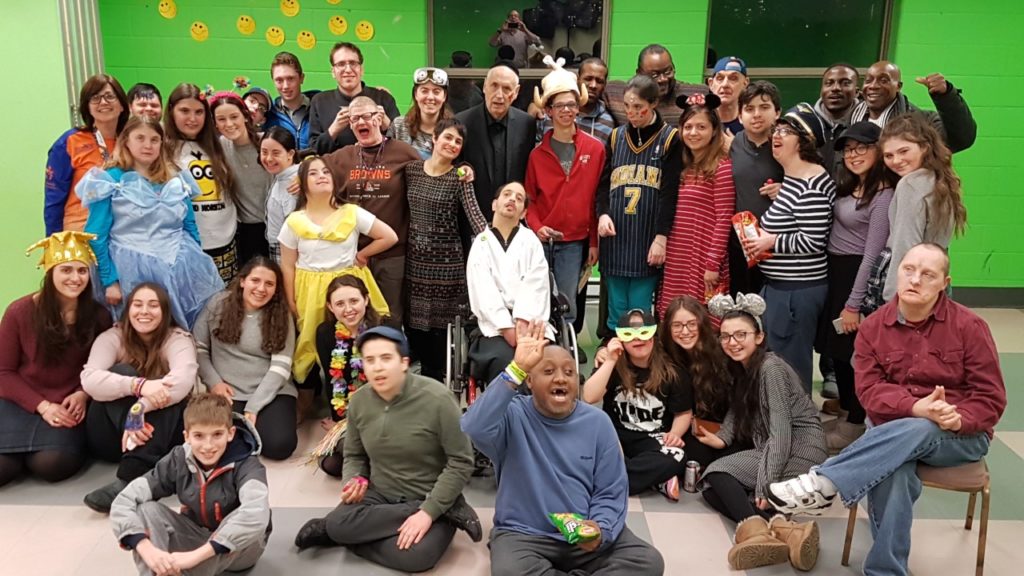Canadian Jewish organizations will be working toward fostering a more inclusive environment for people with disabilities during the month of February.
In Toronto, the three Jewish community centres, Toronto Yachad, UJA Federation of Greater Toronto and DANI Toronto will all be hosting a multitude of events this month, under the label of either North American Inclusion Month, or Jewish Disability Awareness and Inclusion Month.
Representatives from the organizations made sure to point out that promoting inclusion and awareness of people with disabilities is a year-round effort, but designating February as inclusion month provides an opportunity to focus some of that effort.
“This is community organized and community driven,” said Liviya Mendelsohn, director of accessibility and inclusion at the Miles Nadal Jewish Community Centre and co-ordinator of UJA Federation’s Itanu inclusion initiative. “This month is bringing together programs and initiatives that are grassroots from all of these different organizations and there’s the opportunity to deepen and continue the work all year round.”
For most of February, both the Miles Nadal and Schwartz/Reisman JCCs will feature art exhibits on the theme of inclusion. Other programs include a panel on disability and a panel on improving accessibility in the community, as well as the annual policy day, in which people with disabilities, their advocates and Jewish community professionals from across Canada travel to Ottawa to try to influence policy in favour of accessibility.
The month will also feature a number of activity-based programs. There will be inclusive Zumba classes every Monday night at the Beth Avraham Yoseph of Toronto synagogue, as well as inclusive cooking classes, music and yoga sessions at the Prosserman Jewish Community Centre on Thursday nights. Yachad is also hosting an inclusive Shabbaton at Shaarei Shomayim on Feb. 15.
READ: A VARIETY OF EVENTS IN MONTREAL OFFERED DURING JEWISH DISABILITY MONTH
For Yachad, which was founded by the Orthodox Union to address the needs of Jewish people with special needs, the term “inclusion” has a very specific meaning. A Yachad event is open to everyone, regardless of budget or abilities. Events are designed for anyone and everyone to attend and enjoy, not just people with special needs.
Devorah Marmer, the director of Toronto Yachad, estimates that a Yachad Shabbaton might attract 30 to 35 people with special needs and around two or three times that many mainstream people.
“The parents of our participants have told us that the social issues for their children is their hardest challenge. That’s what they really are missing,” said Marmer. “And that’s why our programs are so popular, because people with special needs just want to socialize like everybody else, they just want to have friends like everybody else and they just want to belong.”
When Marmer took over as director six years ago, Toronto Yachad was running about six events annually. Now that number is closer to 100 and attendance at the events has increased exponentially. Yachad hosted its fifth annual educational conference in November, which was attended by over 350 educators from 17 Toronto schools. It also runs vocational programs at both a day camp and an overnight camp during the summer.

Throughout February, Yachad will be leading sensitivity training sessions at schools in Toronto and Montreal about how to include people with disabilities in everyday life. Marmer has seen the effects of these kinds of programs since she joined Toronto Yachad.
“I’ve seen children and adults become more welcoming and accepting to people with special needs,” she said. “Many high school and university students have expressed to me how Yachad has impacted their careers and helped shape and develop them into who they are.”
Accessibility and inclusion initiatives have made big strides in the last few years, but Mendelsohn believes they haven’t come close to achieving their goals.
“I think there are physical barriers, in terms of the built environment and the accessibility of our buildings. There are attitudinal barriers and a lot of stigma that we are working hard to open up and shift. There are systemic barriers around who has access, there are financial barriers,” said Mendelsohn. “So there’s a lot of work to do and this is a time when we really come together as a community and focus.”
More information on this month’s events can be found at jewishtoronto.com/jdaim and yachad.org/toronto/events.
